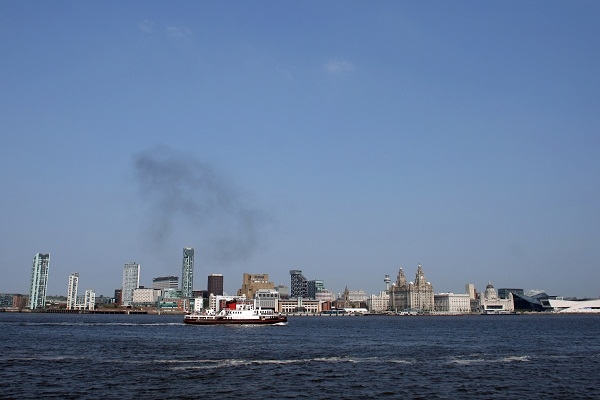Reading a short story by Kevin Barry is a bit like listening to a kraut-rock-record from the 1970s. The foundations are built on a solid rhythm. Then every so often, the form veers left-field, unveiling a portal to a world of magic.
In this sense, you could argue that Barry is an experimental writer. He spends considerable time wrestling with language, bending each turn of phrase and piece of dialogue into shape, until he’s convinced he can make it sing.
As far as modulating with the form itself, Barry works from tradition: giving his readers short vignettes of isolated individuals — mostly men, who have failed in one way or another.
In ‘A Cruelty’, part of Barry’s new collection Dark Lies the Island, we witness Donie, a shy, sensitive soul, whose daily regimental excursion, from Roscommon to Sligo, is transformed into a hellish onslaught, as a heartless bully picks him apart, piece by piece.
The pitch-perfect diction of ‘Beer Trip to Llandudno’ (for which Barry won The Sunday Times EFG Private Bank Short Story Award) adumbrates a group of middle-aged real-ale drinkers, on a jolly-boys-outing from Liverpool to Wales. The milieu of the moving train enables the narrator to concurrently dictate the inane banter between the men; the pulchritude of the surrounding countryside; as well as his own toxic thoughts, which become increasingly melancholic the more alcohol he consumes. On the return journey, Barry’s true craftsmanship is displayed, as he adroitly composes a seemingly forgettable moment, into a Larkinseque, existential epiphany: ‘We were all six of us quiet as the grave on the evening train then. It grew and built, it was horrible the silence.’
Of the thirteen stories in this collection just five are told in the first person. And yet, in the remaining eight — narrated in the third person — Barry manages to maintain his energetic idiom. He does this by mastering free indirect style: the narration technique that sees the world through the character’s eyes and language, but also through the author’s, too.
In ‘The Mainland Campaign’ we witness Steven walking down Kensington Church Street after ‘he [buys] a tin of lager in the paki shop’. The narrator in ‘White Hitachi’ reveals that ‘Patrick was himself thirty-six, if it’s ages we’re on about’. And in ‘A Cruelty’ we’re told that ‘when it comes to sandwiches, Donie is straight down the line. No Messing.’
By thinking in the same colloquialisms as his own characters, Barry commands authorial omniscience. Moreover, by mixing up the vernacular — and the intricate rhythms of Hiberno-English — with the formal — which decelerates the prose — these stories present an interesting polarity between Barry’s idiosyncratic humour, and his sombre sense of poetic introspection. It’s his ability to balance this combination which makes him such a compelling storyteller.
Not every tale here is flawless however.
In ‘Ernestine and Kit’, which depicts two elderly ladies who drive around rural-Ireland looking for small children to abduct, the story’s ambivalent tone fails to convince. When Barry presents an image of two crows surrounding a small baby in a lay-by, he wants us to be disturbed. Instead, the reader is left neither amused, nor horrified, but simply disillusioned, primarily because the sudden gear-change the story takes, doesn’t fit with the jocular tone that precedes it.
In ‘Berlin Arkonaplatz’, which recalls a summer romance between two bohemians living in Europe’s capital of culture, the observations about the mindless, empty rhetoric of dilettante-hipsters, seems too bland an idea for such a gifted writer to waste his time on.
Throughout Dark Lies the Island, the ghosts of dead Irish writers can be heard gently whispering in the shadows of Barry’s sharp, sinewy sentences. At the beginning of ‘Ernestine and Kit’, we’re in Yeats country, and told that the ‘sky of Lough Gill was deep blue’, and ‘there was a lengthy queue for the ferry ride to the lake isle of Inishfree.’
Indeed when you read aloud a line like ‘the estuary sulked away in terrific heat and Birkenhead shimmered across the water’, it appears that Yeats’ majestic influence is never far from Barry’s consciousness.
But it’s ‘Across the Rooftops’, a simple tale of a young man’s failed attempt to kiss a girl at a house-party, that’s arguably Barry’s finest moment. The man’s hopeless inadequacy portrays — as a brilliant short story should — how failure itself, can be a form of enlightenment: ‘I sat there until all that had been about us had faded again to nothing, until the sound of the crowd died and the music had ended, and we all trailed home along the sleeping streets, with youth packed away, and life about to begin.’
Dark Lies The Island by Kevin Barry is published by Jonathan Cape (£12.99)






Comments